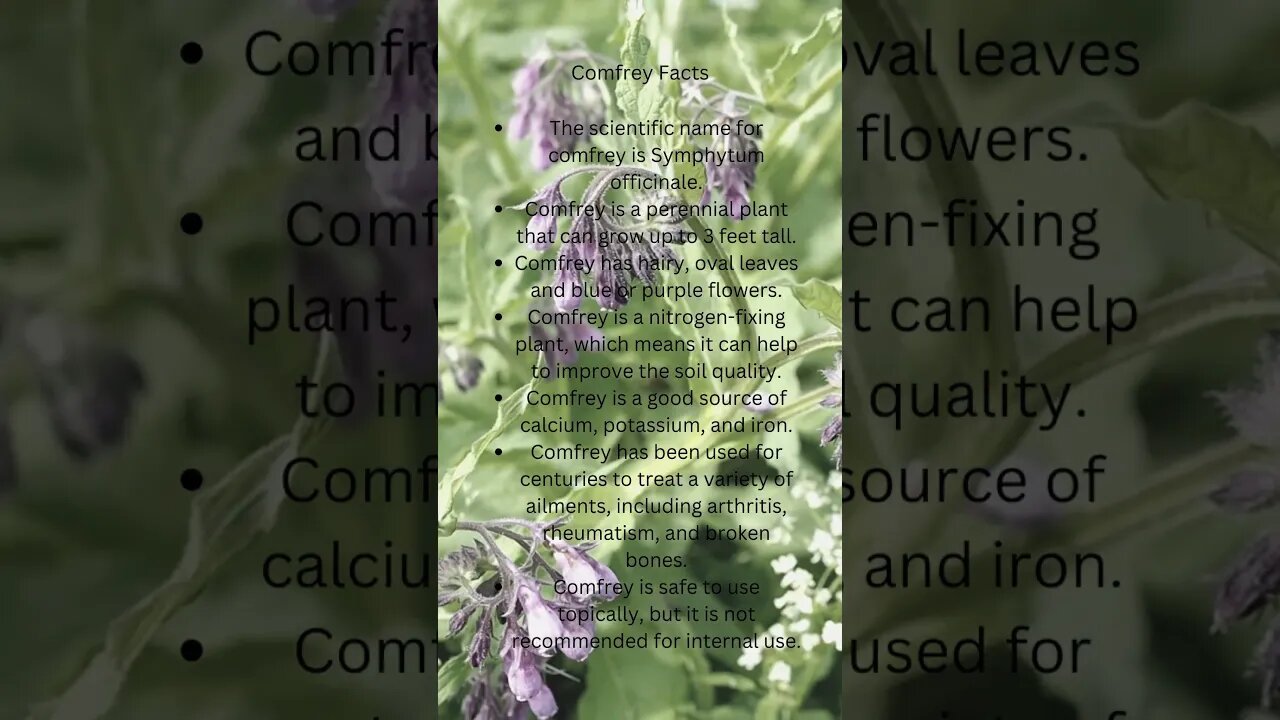Premium Only Content

🌿Comfrey Facts🌿 #shorts #herbalism #homesteading #gardening
Link to full Video: https://youtu.be/zpjgSXQFBgk
Website: www.bleighve.com
Instagram: https://www.instagram.com/bleighvehomestead/
Rumble: https://rumble.com/account/content?type=all
TikTok: https://www.tiktok.com/@bleighve?lang=en
Comfrey is a plant that has been used for centuries for its medicinal properties. It is native to Europe and Asia, but has been naturalized in many other parts of the world. The plant has a long history of use in traditional medicine, and was even mentioned in the Ebers Papyrus, an ancient Egyptian medical text.
In mythology, comfrey is associated with the Greek goddess Aphrodite. It is said that Aphrodite used comfrey to heal the wounds of her lover, Adonis. Comfrey is also said to have been used by the Vikings to heal wounds and bruises.
In the Middle Ages, comfrey was used to treat a variety of ailments, including arthritis, rheumatism, and broken bones. It was also used as a topical treatment for burns and wounds. Comfrey was even used to make a type of beer!
In the 19th century, comfrey was one of the most popular medicinal herbs in the world. It was used to treat a wide variety of conditions, including anemia, digestive problems, and kidney stones. Comfrey was also used to make a type of poultice that was applied to wounds and bruises.
In the 20th century, comfrey was still used for medicinal purposes, but its popularity began to decline. This was due to concerns about the safety of comfrey. Some studies have shown that comfrey can be toxic to the liver, especially when taken internally. As a result, comfrey is no longer recommended for internal use.
Today, comfrey is still used topically for its healing properties. It is also used as a fertilizer and a compost activator. Comfrey is a versatile plant with a long history of use. It is a valuable addition to any garden or home apothecary.
-
 27:09
27:09
MYLUNCHBREAK CHANNEL PAGE
13 hours agoDilmun: Where Life Never Ends
49.7K34 -
 LIVE
LIVE
Slightly Offensive
6 hours ago $10.24 earnedHas Trump FAILED US? The ABSOLUTE STATE of The Right Wing | Guest: Nick Fuentes
9,679 watching -
 1:37:05
1:37:05
AlaskanBallistics
2 hours ago $0.08 earnedI Love This Gun PodCast #16
6.89K -
 2:59:26
2:59:26
Twins Pod
11 hours agoEMERGENCY PODCAST WITH ANDREW TATE! - Twins Pod - Special Episode - Andrew Tate
128K128 -
 2:52:01
2:52:01
Jewels Jones Live ®
2 days agoTRUMP SECURES BORDER | A Political Rendezvous - Ep. 113
55.1K30 -
 25:02
25:02
marcushouse
23 hours ago $4.85 earnedStarship Just Exploded 💥 What Went Wrong This Time?!
140K65 -
 12:00
12:00
Silver Dragons
1 day agoBullion Dealer Reveals Best Silver to Buy With $1,000
85.1K9 -
 12:58
12:58
NinjaGamblers
14 hours ago $2.21 earnedIs This The BEST Way to Win At Roulette? 😲
129K13 -
 1:01:54
1:01:54
CharLee Simons Presents Do Not Talk
2 days agoCALIFORNIA'S DONE!
87.4K38 -
 7:33
7:33
MudandMunitions
1 day agoUnboxing My FIRST Revolver! Smith & Wesson 442 .38 Special and What’s Coming Next for the Channel
117K16